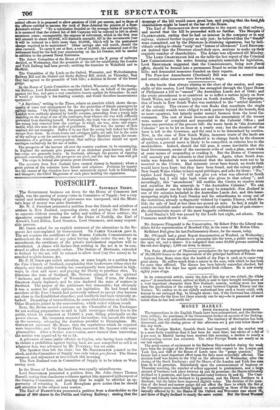In the bustle that always obtains at the close of
the session, and espe- cially of this session, Lord Stanley, has smuggled through the Upper House of Parliament a bill to "amend" the Australian Lands Act of 1842; and the crude amendment is so contrived as to inflict a serious injury on New South Wales, and one equally unjust on South Australia. The approprias t,ion of lands in New South Wales was restricted to the "settled districts" of the colony. The owners of the vast flocks that constitute the staple of the colonial wealth were obliged to seek pasture beyond the bounds, first as mere squatters, but latterly under annual licences from the local Go- vernment. The cost of those licences and the uncertainty of the tenure were matter of complaint and memorial to the Colonial Office • and hence one provision of the present bill: the waste lands in "the Australian Colonies" are to be let on lease at a yearly rent; but the duration of the lease is left to the Governor, and the rent is to be determined by auction. Now, in the case of New South Wales, immense tracts of the lands are already occupied; and if the leasehold is to change hands by the chances of auction, a general move is likely to be compelled, at ruinous loss to the stockholders. Indeed, should the bill pass, it seems inevitable that the local Government, aware of the enormous evils of such a plan, must wink at some means of suspending or evading it. But the House of Commons will scarcely put the colonists to that trouble. Again, when South Aues trent was founded, it was understood that the minerals were not to be reserved to the Crown. Had minerals never been found, no doubt faith would have been kept: but they have been found, and the colony profits: New South Wales wishes to have equal privileges, and asks for them: No," replies Lord Stanley; "I will not give you what was allowed to South Australia; but I will take back what was given to that colony "; and accordingly, this "amendment" bill enables the Crown to reserve rents and royalties for the minerals in "the Australian Colonies." We can imagine another use for which this act may be intended: New Zealand in one of the colonies included in the Australian Lands Act, and this lease- mongering might help Lord Stanley and his subordinates to creep out of the restriction, already so flagrantly violated by Captain Fitzroy, which for- bids the sale of land at less than one pound an acre. In fact, it might be used to reestablish under another name the old exploded plan of quit-rents- the characteristic tenure of the most beggarly settlements.
Lord Stanley's bill was passed by the Lords last night, sub silentio. The Commons must-throw it out.


























 Previous page
Previous page